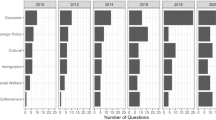Conclusion
It is clear that the survival rate of officials who choose “popular” courses of action is greater than that of officials who choose “best” courses of action. Still, there are few officials who would vote forany course of action merely because it was popular. There are also several factors which limit the proposition that politicians to survive must be mercurial barometers of public opinion.
First, a large number of politicians represent constituencies in which they are “safe” in following their own judgments within a wide range of latitude. Thus, as long as William Fulbright does not offend the voters of Arkansas on the civil rights issue, he can take a position contrary to the views of the largest part of his constituency on foreign policy and still be re-elected.
Secondly, there seems to be some tendency for the politician to resolve the dilemma of what to represent by allowing himself to actually believe the popular position. In other words, in his own mind, the divergence between his judgment and the popular position merges as he pays more attention to reasons in defense of the popular position than the reasons opposed to it. The author experienced this phenomenon in his own campaign. The politician, as a politician, is primarily interested in election, no objective social analysis, and his judgment can become quite biased by his political interest.
Similar content being viewed by others
References
The best definition of “ethical” comes from Kenneth Boulding. “A moral, or ethical proposition, is a statement about a rank order or preference among alternatives, which is intended to apply to more than one person. ... a ‘common value’.” Kenneth Boulding, “Economics as a Moral Science,”Amer. Econ. Rev. (March 1969).
Author information
Authors and Affiliations
Rights and permissions
About this article
Cite this article
Ireland, T.R. The politician's dilemma: What to represent. Public Choice 12, 35–41 (1972). https://doi.org/10.1007/BF01718468
Issue Date:
DOI: https://doi.org/10.1007/BF01718468




